Athletes often face mental fatigue and stress, which can hinder performance and recovery. Adaptogens, such as ashwagandha and Rhodiola rosea, help reduce these challenges by regulating cortisol levels and enhancing cognitive function. This article explores the unique attributes of various adaptogens, regional perceptions influencing their use, and best practices for effective incorporation into recovery routines. Understanding these factors can lead to improved mental clarity and resilience for athletes.
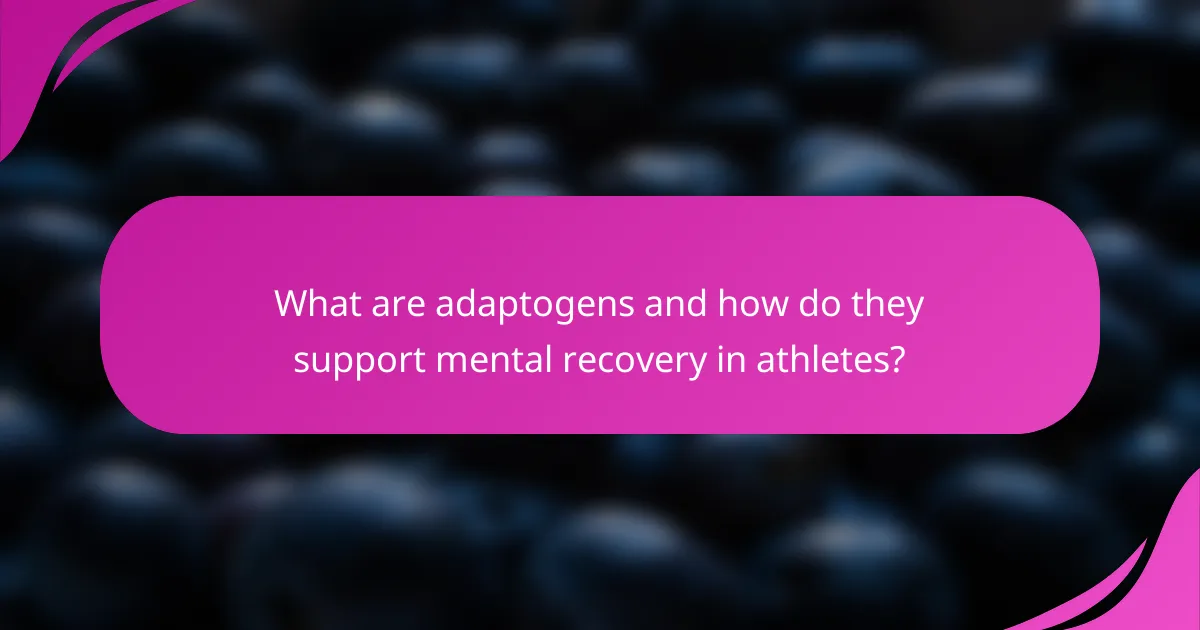
What are adaptogens and how do they support mental recovery in athletes?
Adaptogens are natural substances that help athletes recover mentally by reducing stress and enhancing resilience. They regulate cortisol levels and improve cognitive function, leading to better focus and performance. Research shows that adaptogens like ashwagandha and Rhodiola rosea can significantly decrease fatigue and anxiety, promoting mental clarity. Incorporating these into an athlete’s regimen may support overall mental recovery, making them valuable for optimal performance.
What are the key benefits of using adaptogens for mental recovery?
Adaptogens significantly enhance mental recovery in athletes by reducing stress and improving resilience. These natural substances, like ashwagandha and rhodiola, help regulate cortisol levels, promoting a balanced mood. Research indicates that adaptogens can decrease fatigue and enhance cognitive function, leading to quicker recovery post-exercise. Their unique ability to adapt to the body’s needs makes them particularly effective in supporting mental clarity and focus during training and competition.
How do adaptogens influence stress response in athletes?
Adaptogens enhance athletes’ stress response by regulating cortisol levels and promoting resilience. They help mitigate fatigue and improve recovery through their impact on the endocrine system. For example, ashwagandha has been shown to significantly reduce stress and anxiety, leading to better performance outcomes. Additionally, rhodiola rosea can enhance endurance and reduce perceived exertion during workouts. These adaptogens support mental clarity and focus, crucial for athletic success.
What mechanisms underlie the stress-reducing effects of adaptogens?
Adaptogens reduce stress through multiple mechanisms, including modulation of the hypothalamic-pituitary-adrenal (HPA) axis and regulation of neurotransmitters. They enhance resilience to stressors by balancing cortisol levels, promoting a sense of calm. For example, ashwagandha has been shown to lower cortisol by up to 30%. Additionally, adaptogens may improve mental recovery by increasing brain-derived neurotrophic factor (BDNF), which supports cognitive function and mood stability. This unique attribute of adaptogens contributes to their effectiveness in enhancing mental recovery for athletes under stress.
Which adaptogens are most commonly used for mental recovery?
Commonly used adaptogens for mental recovery in athletes include ashwagandha, rhodiola rosea, and ginseng. Ashwagandha is known for reducing stress and anxiety, enhancing cognitive function. Rhodiola rosea helps combat fatigue and improves mental clarity. Ginseng boosts energy levels and supports overall mental performance. Each adaptogen offers unique benefits that contribute to mental recovery, making them popular choices among athletes.
What are the specific properties of Rhodiola Rosea?
Rhodiola Rosea possesses several specific properties that enhance mental recovery in athletes. It acts as a powerful adaptogen, reducing fatigue and improving cognitive function. Key attributes include stress reduction, increased endurance, and enhanced mood regulation. Unique to Rhodiola is its ability to modulate serotonin levels, contributing to improved mental clarity. Rarely, it may also support immune function, providing an additional recovery benefit for athletes.
How does Ashwagandha contribute to mental resilience?
Ashwagandha enhances mental resilience by reducing stress and anxiety, promoting emotional stability. Its unique adaptogenic properties help athletes recover from mental fatigue, improving focus and performance. Studies indicate that ashwagandha can lower cortisol levels, which is crucial for mental recovery. Regular intake may lead to improved cognitive function and resilience against stressors.
What role does Holy Basil play in reducing anxiety?
Holy Basil significantly reduces anxiety by balancing cortisol levels and enhancing stress resilience. This adaptogen helps athletes recover mentally, promoting a calm state and improving focus during intense training. Studies show that Holy Basil can lower anxiety symptoms, making it a valuable tool for mental recovery. Its unique ability to modulate stress responses sets it apart from other herbs, contributing to overall well-being.
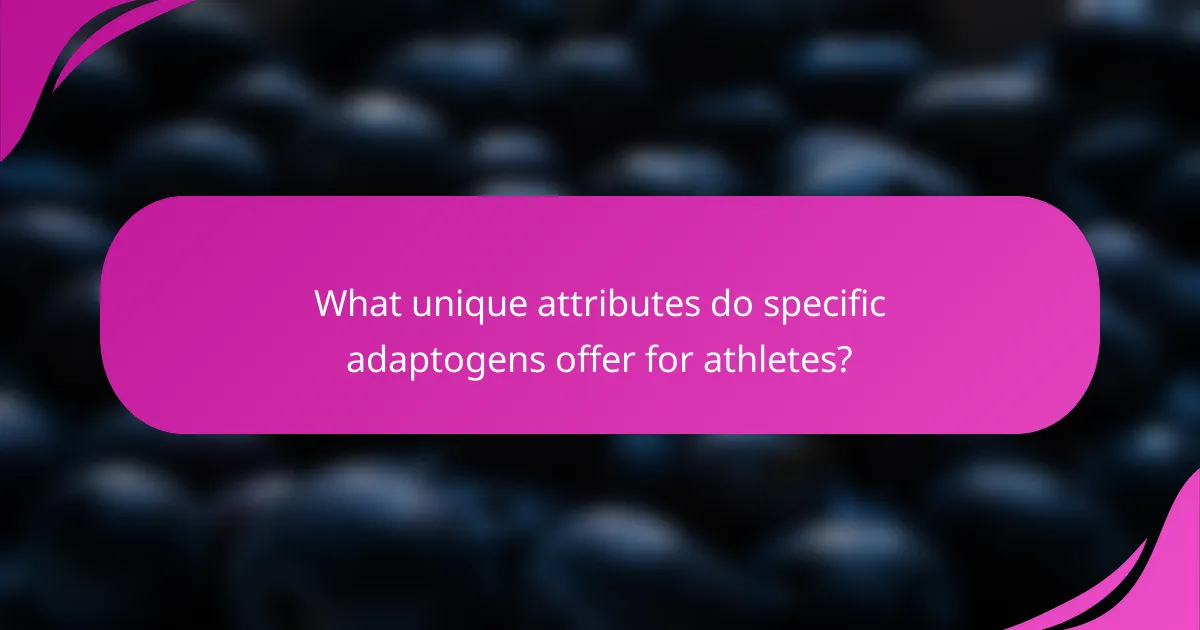
What unique attributes do specific adaptogens offer for athletes?
Certain adaptogens offer unique attributes that enhance mental recovery for athletes. Rhodiola rosea improves cognitive function and reduces fatigue, while ashwagandha decreases stress and anxiety levels. Ginseng enhances endurance and boosts energy. Holy basil supports mental clarity and resilience under pressure. These attributes contribute significantly to an athlete’s overall performance and recovery process.
How does the timing of adaptogen intake affect recovery?
Timing of adaptogen intake significantly influences recovery in athletes. Taking adaptogens post-exercise can enhance stress resilience and support mental recovery. Research shows that consuming adaptogens like Rhodiola rosea within 30 minutes after training optimizes cortisol levels, aiding recovery. Additionally, morning intake may boost energy and focus throughout the day, while evening consumption can promote relaxation and sleep quality. The unique attribute of adaptogens lies in their ability to adapt to the body’s needs, tailoring recovery support based on individual circumstances.
What are the unique formulations of adaptogens tailored for athletes?
Unique formulations of adaptogens for athletes include blends of Rhodiola Rosea, Ashwagandha, and Eleutherococcus senticosus. These adaptogens enhance mental recovery by reducing stress and improving focus. Rhodiola Rosea is known for its unique attribute of increasing endurance during high-intensity workouts. Ashwagandha offers rare benefits like lowering cortisol levels, which aids in recovery. Eleutherococcus senticosus enhances stamina, making it a valuable addition for athletes.
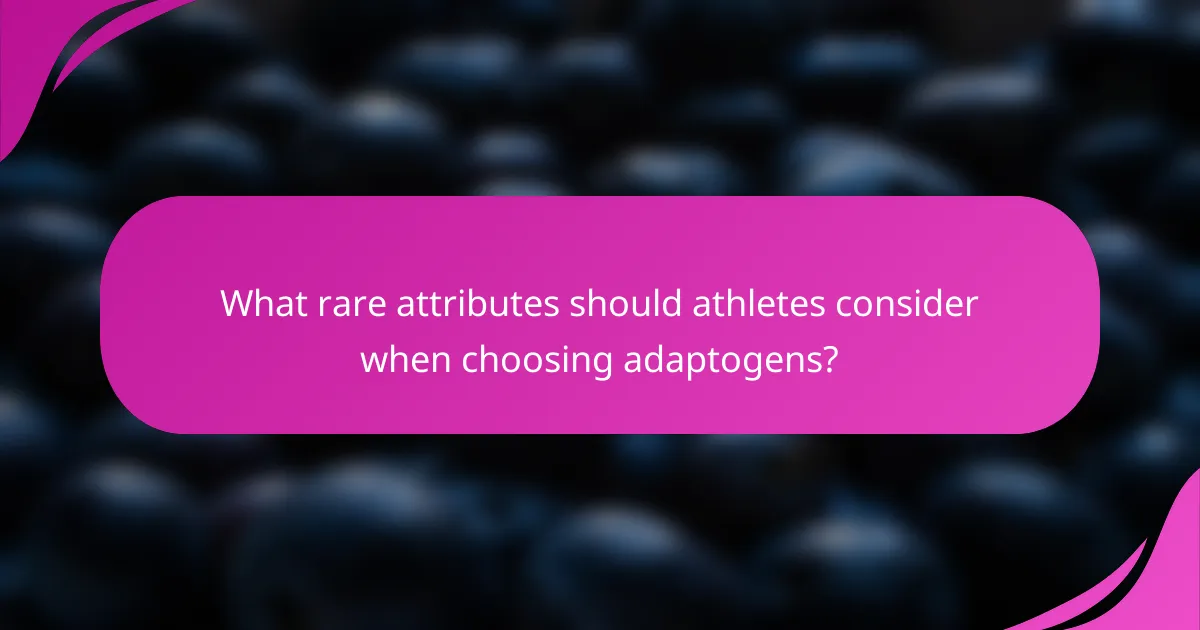
What rare attributes should athletes consider when choosing adaptogens?
When choosing adaptogens, athletes should consider rare attributes such as specific synergistic effects, individual metabolic responses, and unique sourcing practices. These factors can influence effectiveness and personal tolerance. For example, some adaptogens may enhance cognitive function uniquely for certain athletes, while others may be sourced sustainably, impacting overall health and performance. Understanding these rare attributes can lead to more tailored and effective recovery strategies.
Are there specific adaptogens that enhance cognitive function post-exercise?
Yes, certain adaptogens can enhance cognitive function post-exercise. Rhodiola rosea, for example, improves mental clarity and reduces fatigue. Panax ginseng has shown potential in boosting attention and memory. Ashwagandha may support overall cognitive health and stress reduction, aiding recovery. These adaptogens promote resilience and cognitive performance, making them valuable for athletes.
What are the less common side effects of adaptogens in athletic contexts?
Less common side effects of adaptogens in athletic contexts include digestive upset, insomnia, and changes in heart rate. These effects may arise due to individual reactions or specific adaptogen types. For instance, rhodiola may cause irritability in sensitive individuals. Additionally, some adaptogens can interact with medications, leading to rare side effects. Monitoring and adjusting dosages can help mitigate these issues.
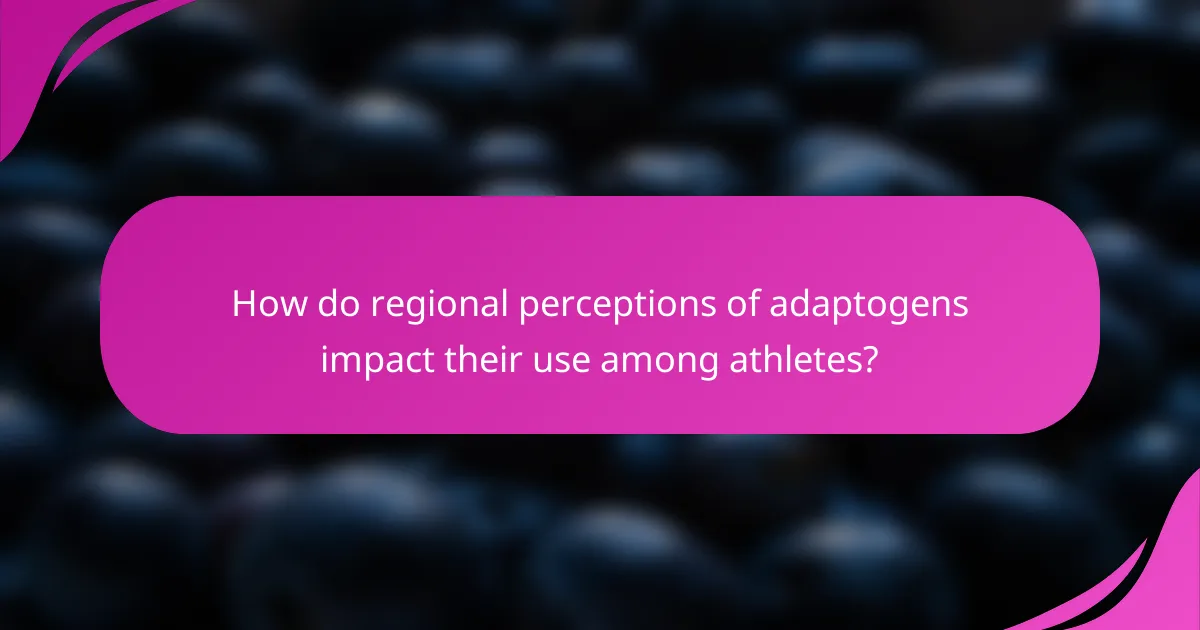
How do regional perceptions of adaptogens impact their use among athletes?
Regional perceptions of adaptogens significantly influence their acceptance and use among athletes. In cultures where traditional medicine values these herbs, athletes are more likely to integrate them into their recovery routines. For example, in Eastern Europe and Asia, adaptogens like Rhodiola rosea are widely recognized for enhancing physical performance and mental resilience. Conversely, in regions where scientific validation is prioritized, such as North America, skepticism may limit their adoption despite growing interest. This cultural context shapes not only the types of adaptogens used but also the perceived benefits, emphasizing the need for tailored education and marketing strategies to address regional attitudes.
What cultural differences exist in the acceptance of adaptogens?
Cultural acceptance of adaptogens varies significantly across regions. In Eastern cultures, particularly in traditional Chinese medicine and Ayurveda, adaptogens are widely embraced for their holistic benefits on mental recovery and overall health. Conversely, in Western societies, acceptance is growing but often faces skepticism due to lack of extensive scientific validation.
In Japan, for example, adaptogens like ashwagandha and reishi mushrooms are gaining popularity among athletes for their stress-reducing properties. Meanwhile, in the United States, athletes increasingly seek adaptogens as natural alternatives to pharmaceuticals, highlighting a shift in mindset towards natural health solutions.
The unique attribute of adaptogens lies in their ability to enhance mental resilience, which resonates well with athletes seeking competitive advantages. However, rare attributes such as specific cultural endorsements can influence acceptance levels, making it essential to consider regional attitudes when promoting these substances.
How do local regulations affect the availability of adaptogens for athletes?
Local regulations significantly influence the availability of adaptogens for athletes. These regulations can restrict or promote the sale of specific adaptogenic herbs based on safety assessments and health claims. For instance, some regions may classify certain adaptogens as dietary supplements, allowing broader access, while others may impose strict guidelines limiting their use in sports. Additionally, athlete compliance with anti-doping regulations can further affect the market, as some adaptogens may be banned or require certification. As a result, athletes must navigate these complex legal landscapes to ensure they can access effective mental recovery aids.
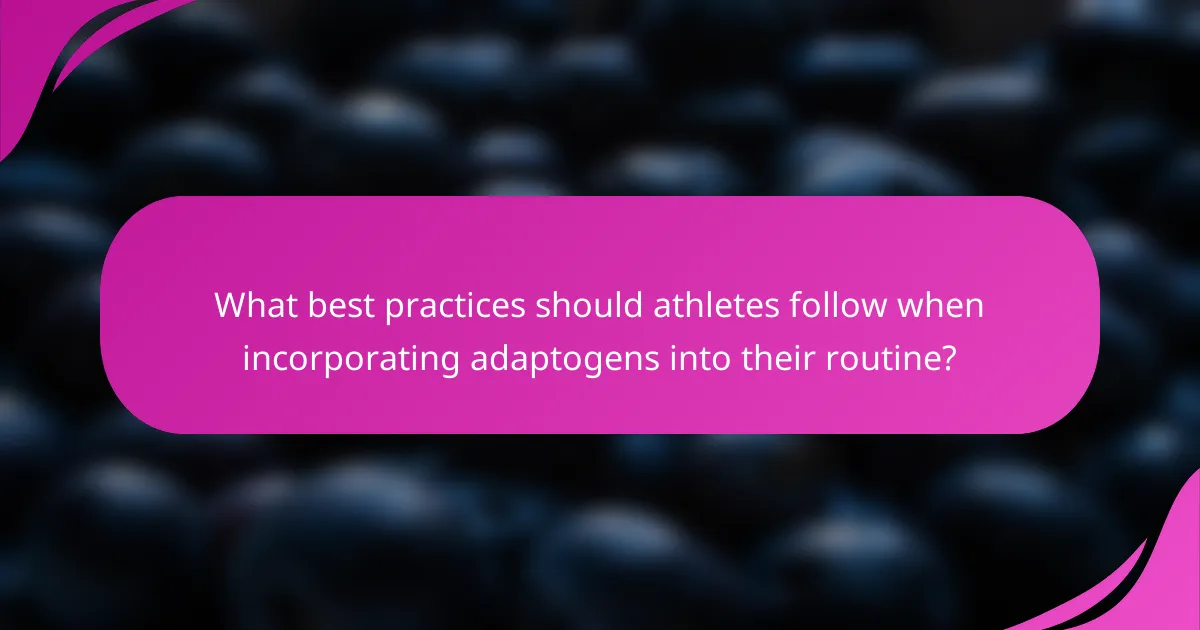
What best practices should athletes follow when incorporating adaptogens into their routine?
Athletes should follow specific best practices when incorporating adaptogens into their routine to enhance mental recovery. First, consult a healthcare professional to determine the right adaptogen and dosage. Gradually introduce adaptogens to monitor effects and avoid adverse reactions. Prioritize high-quality sources to ensure purity and potency. Incorporate adaptogens consistently, as their benefits accumulate over time. Lastly, combine adaptogens with a balanced diet and adequate hydration for optimal recovery.
What common mistakes should be avoided when using adaptogens?
Avoiding common mistakes when using adaptogens is crucial for maximizing their benefits in mental recovery for athletes. Key mistakes include improper dosage, neglecting individual responses, and overlooking potential interactions with other supplements or medications.
Inadequate dosage can lead to ineffective results, while excessive intake may cause unwanted side effects. Each athlete may respond differently to adaptogens, so personalizing the approach is essential. Additionally, failing to consider interactions can hinder recovery and overall performance.
By being mindful of these pitfalls, athletes can enhance their mental recovery and optimize the use of adaptogens effectively.
How can athletes optimize the benefits of adaptogens for mental recovery?
Athletes can optimize the benefits of adaptogens for mental recovery by incorporating them into their daily routines, focusing on specific types, and timing their intake effectively.
First, regular consumption of adaptogens like ashwagandha and rhodiola can enhance resilience to stress and improve cognitive function. Athletes should consider a dosage of 300-600 mg of ashwagandha daily for optimal results.
Second, combining adaptogens with a balanced diet and hydration supports overall mental recovery. Foods rich in antioxidants and omega-3 fatty acids further enhance the effects of adaptogens.
Lastly, timing is crucial; consuming adaptogens post-training helps mitigate stress and promotes recovery. Incorporating these strategies can maximize mental recovery and improve athletic performance.